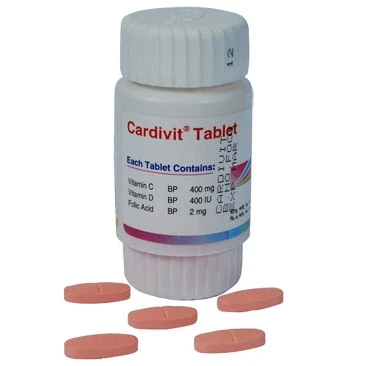Cardivit Uses, Dosage, Side Effects and more
Ascorbic acid (vitamin C) & Folic acid (also known as Vitamin B9) are water-soluble vitamins. Vitamin D is fat-soluble. Ascorbic acid helps integration & cohesiveness of cells by synthesizing collagen which is also known as biological glue. It is also a powerful antioxidant in the aqueous media. Vitamin D is also known as antirachitic and sun-shine vitamin which displays its roles like a hormone (pro-hormone). Vitamin D spares calcium in the body by reducing excretion and enhancing calcium absorption. Folic acid is crucial for proper brain function and plays an important role in mental and emotional health. It aids in the production of DNA and RNA, the body's genetic material, and is especially important during periods of high growth, such as infancy, adolescence and pregnancy. It controls blood levels of the amino acid Homocysteine. Elevated levels of this substance appear to be linked to certain chronic conditions such as heart disease. Indications: Deficiency states of Vitamin C, Vitamin D and Folic acid associated with cardiovascular diseases, Deficiency states of Vitamin-C (Scurvy, generalized weakness, gum bleeding, after acute infections, alcoholism and postoperatively), Wound healing, Prevention of cold, flue and influenza, Megaloblastic anemia and anemia of nutritional origin, Deficiency states of Vitamin-D (Intestinal malabsorption, chronic liver disease, osteomalacia, osteopenia, rickets, hypocalcemia, institutionalized patients, persons who use sunscreen, black people, person who covers most of the body surface due to cultural and religious purpose). Familial hypophosphatemia, Hypoparathyroidism, As adjuvant with calcium supplement, Prevention of osteoporosis and fracture alone or in combination with calcium supplement, Conditions where demand for Vitamin-C, Vitamin-D and Folic acid increases (pregnancy, lactation, smoking and old age, person living in polluted environment).

| Attribute | Details |
|---|---|
| Trade Name | Cardivit |
| Generic | Vitamin C + Vitamin D3 + Folic acid |
| Weight | 400mg+400iu+2mg |
| Type | Tablet |
| Therapeutic Class | Specific combined vitamin preparations |
| Manufacturer | Incepta Pharmaceuticals Limited |
| Available Country | Bangladesh |
| Last Updated: | January 7, 2025 at 1:49 am |
Uses
Calcium and Vitamin-D is used for the treatment of osteoporosis, osteomalacia, rickets, tetany, and parathyroid disease. Also used in raised calcium requirement for children and adolescents at times of rapid growth, inadequate intake of calcium in the diet due to malnutrition, prevention and treatment of osteoporosis, disorders of osteogenesis and tooth formation (in addition to specific treatment), latent tetany and during pregnancy and lactation. It is also used as routine supplement and phosphate binder in chronic renal failure.
Cardivit is also used to associated treatment for these conditions: Anaemia folate deficiency, Folate deficiency, Iron Deficiency (ID), Iron Deficiency Anemia (IDA), Latent Iron Deficiency, Neural Tube Defects (NTDs), Vitamin Deficiency, Methotrexate toxicity, Nutritional supplementation
How Cardivit works
Folic acid, as it is biochemically inactive, is converted to tetrahydrofolic acid and methyltetrahydrofolate by dihydrofolate reductase (DHFR). These folic acid congeners are transported across cells by receptor-mediated endocytosis where they are needed to maintain normal erythropoiesis, synthesize purine and thymidylate nucleic acids, interconvert amino acids, methylate tRNA, and generate and use formate. Using vitamin B12 as a cofactor, folic acid can normalize high homocysteine levels by remethylation of homocysteine to methionine via methionine synthetase.
Dosage
One tablet twice daily with food or as directed by the physician.
May be taken with or without food.
How Long Does It Take to Work?
How Long Does It Take to Work? see here Cardivit
Side Effects
Vitamin C, Vitamin D3 & Folic acid combination is well tolerated. Mild gastrointestinal disturbances may occur.
Toxicity
IPR-MUS LD50 85 mg/kg,IVN-GPG LD50 120 mg/kg, IVN-MUS LD50 239 mg/kg, IVN-RAT LD50 500 mg/kg, IVN-RBT LD50 410 mg/kg
Precaution
Caution should be taken in patients with Renal impairment, Sarcoidosis, Hypercalcemia and Hypercalciuria, Cardiac disease.
Interaction
Concurrent administration of Thiazide diuretics may increase the risk of hypercalcemia. Calcium salts reduce the absorption of a number of other drugs such as Biphosphonates, Fluoride, some Fluoroquinolones and Tetracyclines.
Volume of Distribution
Tetrahydrofolic acid derivatives are distributed to all body tissues but are stored primarily in the liver.
Elimination Route
Folic acid is absorbed rapidly from the small intestine, primarily from the proximal portion. Naturally occurring conjugated folates are reduced enzymatically to folic acid in the gastrointestinal tract prior to absorption. Folic acid appears in the plasma approximately 15 to 30 minutes after an oral dose; peak levels are generally reached within 1 hour.
Elimination Route
After a single oral dose of 100 mcg of folic acid in a limited number of normal adults, only a trace amount of the drug appeared in the urine. An oral dose of 5 mg in 1 study and a dose of 40 mcg/kg of body weight in another study resulted in approximately 50% of the dose appearing in the urine. After a single oral dose of 15 mg, up to 90% of the dose was recovered in the urine. A majority of the metabolic products appeared in the urine after 6 hours; excretion was generally complete within 24 hours. Small amounts of orally administered folic acid have also been recovered in the feces. Folic acid is also excreted in the milk of lactating mothers.
Pregnancy & Breastfeeding use
Pregnancy: There is no contraindication to the use of Cardivit in pregnancy.
Lactation: There is no contraindication to the use of Cardivit in Lactation. Contraindications: This combination is contraindicated in hypercalcemia, hyperparathyroidism, renal calculi, nephrolithiasis, Zoolinger-Ellison syndrome, concomitant Digoxin therapy (requires careful monitoring of serum calcium level).
Contraindication
- Hypercalcemia and hyperparathyroidism
- Hypercalciuria and nephrolithiasis
- Hypersensitivity to the component of Cardivit
- Severe renal insufficiency
- Concomitant digoxin therapy(requires careful monitoring of serum calcium level)
Acute Overdose
Over dosage: If over dosage occurs, therapy should be immediately stopped.
Storage Condition
Store at 15-30° C.



